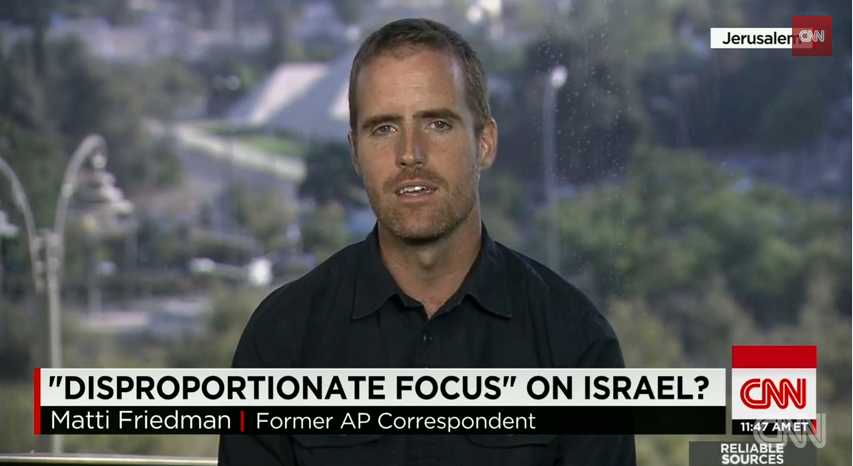WSJ Book Review Takes on “Holocaust Syndrome”

Author and former AP reporter and editor Matti Friedman has previously, like CAMERA, drawn attention to the inaccuracies in media coverage of Israel. Now, in a sharp and funny book review in The Wall Street Journal, Friedman turns his gaze to “non-fiction” inaccuracies. In a review of Padraig O’Malley’s “The Two-State Delusion,” Friedman points out:
More work should have gone into ensuring accuracy. The author asserts, for example, that Israel’s military victory in 1967 resulted from “massive U.S. assistance,” when there wasn’t massive U.S. military assistance before 1967. (France was then the main arms supplier; the planes that won the war were Mirages and Mystères.) We learn that Ariel Sharon was an agriculture minister in 1971 and that this has something to do with the genesis of the settlements; he wasn’t, and it doesn’t. The author describes Israeli soldiers carrying their Uzis “nonchalantly,” which is a nice touch. But no Israeli soldiers carry the Uzi, which was deemed obsolete after the 1973 war and removed from frontline service after that. The word “homeland” is quoted pointedly from the Balfour Declaration of 1917, where that word doesn’t appear. Would it have been too much trouble to check the text? It’s a single sentence.
The sub-headline of the review is “The idea that a collective memory of the Holocaust renders Jewish judgment defective is somehow acceptable these days,” a point Friedman illuminates with this passage:
The “bonding, primal element” of the Jewish psyche, we learn, is the Holocaust. Israelis are in thrall to weapons because of the Holocaust; they are obtuse to the suffering of others because of the Holocaust; and in general they are sort of crazy because of the Holocaust. Actually, half of the Jewish population in Israel has roots in the Islamic world. Their families were displaced by Muslims, not Nazis. Israelis think many of their neighbors are out to destroy Israel not because of the Holocaust, but because many of their neighbors say they are out to destroy Israel. Israel’s actions in the Middle East, in other words, have to do with its experience in the Middle East. The country’s objective success against long odds would have to indicate that at least some of its decisions have been reality-based, if not quite reasonable.
The idea that a collective memory renders Jewish judgment defective seems to be something acceptable to say aloud these days in connection with Israel, which is why I’ve dwelled on it. It’s important to point out not only that this observation is wrong, but that it is a patronizing ethnic smear. I don’t like the careless generalizations in Mr. O’Malley’s book or his shaky grasp of the facts. But I don’t think they have anything to do with the potato famine.
The entire review, unlike the book apparently, is worth reading.
More from SNAPSHOTS
CNN’s Amanpour Condemns “power grab” By Israel’s Prime Minister and Others
April 1, 2020
We’ve said it often, but it’s worth repeating: Anyone interested in reasonably unbiased information about Israel (at least) should avoid the broadcasts of CNN’s Chief International Correspondent and Anchor, Christiane Amanpour. In characterizing responses to [...]
Seattle Media Oblivious To Imam’s Hateful Indoctrination Condemning Jews
January 7, 2020
The Masjid Ar-Rahmah mosque teaching – that Allah transformed Jews into apes and pigs for disobeying him – delivered by Imam (prayer leader) Mohamad Joban – was posted online by mosque personnel. This December 2019 [...]
AP Distorts: Bethlehem ‘Almost Completely Surrounded’
December 10, 2019
Over two years after improving inaccurate language falsely citing Israel's security "barrier surrounding the biblical city" of Bethlehem, the Associated Press once again misrepresents. AP's Joseph Krauss and Mohammad Daraghmeh wrote yesterday ("Palestinians in Bethlehem [...]
Reuters Errs on Administrative Detention For ‘Anti-Israel Activity’
November 5, 2019
The Ofer Prison, near Ramallah (Photo by Tamar Sternthal) A Reuters article today egregiously misrepresents administrative detention, erroneously asserting that it is mainly applied to "Palestinians suspected of anti-Israeli activities," when in fact the Israeli [...]


